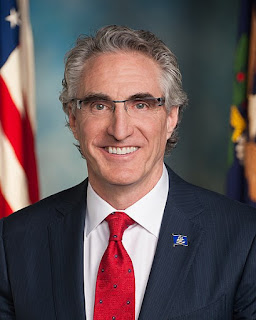In the bizarre world of 21st century American
politics, taking simple public health precautions to reduce coronavirus spread has, too often, created political firestorms. President Donald Trump and Vice President Michael Pence do not
wear masks in public. President Trump famously referred to coronavirus news
reports as “their new hoax.” Vice President Mike Pence's staff required a group of business executives to remove their coronavirus masks before he would meet with them.
North Dakota is a deeply Republican, pro-Trump state with a strong libertarian tradition. Governors, however, need to deal with practical concerns of wise governance that escape Washington’s attention. True to its libertarian tradition, North Dakota does not require citizens to wear masks in public. Nor did Burgum urge citizens to do so. Nor did he wear a mask during his news conference. He did, however, ask North Dakota’s citizens not to shame mask-wearers. Sadly, someone needed to say that. People have shamed me on social media when I suggested wearing masks in public. There have been reports of Trump supporters taunting and assaulting people whose only offense was to wear a mask.
Yet, Burgum wanted to establish an attitude of tolerance for people who wear masks. How did he handle his persuasive challenge?
First, he appealed to unity: “we are all in this together and there’s only one battle we are fighting about, the battle of the virus.” That is, his method was to speak in what persuasion specialist Charles Urban Larson calls a unifying style rather than the more divisive pragmatic style. In that way, Burgum sought to encourage action through unity rather than by dividing us from one another.
Related Link: Reagan or Trump? A Unifying Republican versus a Divisive Republican
Second, Burgum reframed the debate away from politics, denying that wearing a mask was “ideological or political or something.” He explained that, “If someone is wearing a mask, they're not doing it to represent what political party they're in or what candidates they support.”
Also, avoiding a rhetorical mistake that liberal speakers have been known to commit, he ratcheted the value question down to a personal level. Denying that mask-wearing was political, he continued tearfully: “They might be doing it because they’ve got a 5-year-old child who’s been going through cancer treatments. They might have vulnerable adults in their life, who currently have COVID and they’re fighting.”
Someone, like all too many liberal speakers, might
say boring, abstract things, like: “it is the moral thing to protect other
people from being infected.” What Burgum said carried much more power. He talked about a cancer-stricken child or suffering adult.
By being concrete, Burgum flung his point out with a punch.
Yes, we can bridge the gap between conservatives and liberals. We do, however, need to speak in a language that other people will understand. As the conservative, libertarian governor of a conservative, libertarian state, Burgum showed us how it can be done.
Dear readers, please stay healthy!

No comments:
Post a Comment